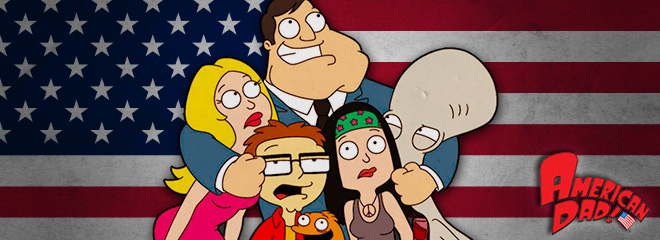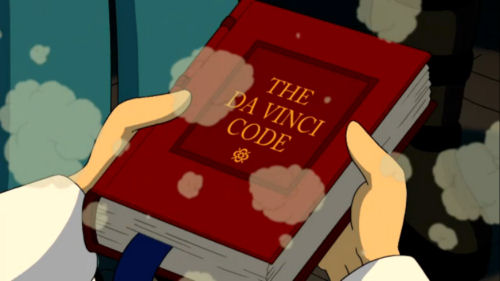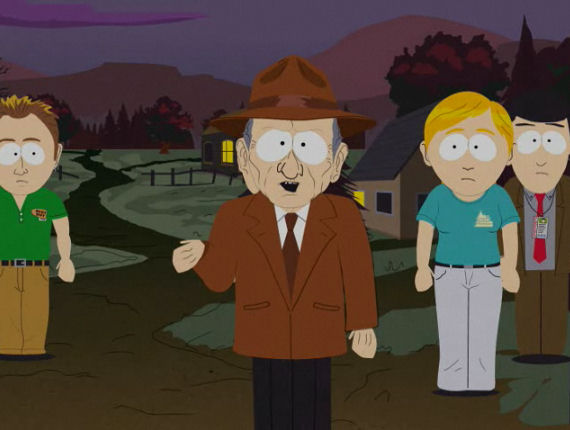Here's a quick one for the Unexpected Literary References list. From American Dad, Season 2 : Ep. 14: An Apocalypse to Remember Hayley: There's no such thing as mutants because the world didn't end. Steve: You lied to us, Dad? Stan: Oh, I tell a great story and I'm a liar, but Harry Potter does it, and he's your favorite writer.
Tag Archives Unexpected Literary References
(part of my ongoing Unexpected Literary References series) Though the wonderful Pablo D'Stair recently called me out on the possible inaccuracy of calling this series "unexpected" literary references, I'm too far in to change the name (re: too lazy to change the name). And this latest find, from last week's episode of The Simpsons, does not help defend any point I may have had about the unexpectedness of lit references in cartoons. Perhaps the series should be called "Great Unexpected Literary References For Those Who Don't Watch Much TV But Also Don't Read Much So Therefore Probably Only Bake Cookies And Make Crafts With Hot Glue Guns." In this episode (S23E7 – "The Man in the Blue Flannel Pants") Bart learns that he actually enjoys reading, and in doing so must hide his new love from Nelson and the rest of the bullies. Why is this reference blog worthy? First, I'm…
(part of my ongoing Unexpected Literary References series) Yesterday (11-20-2011) The Simpsons continued its legacy of literary references with an episode featuring Neil Gaiman, author of American Gods, Anansi Boys, and many others . The episode, "The Book Job" (season 23, episode 6), explores the culture of tween lit, specifically stories featuring vampires and magicians, using an Ocean's Eleven-style heist as the plot backdrop. Though the episode speaks primarily to the idea that tween lit may be hugely factory produced for market consumption rather than intellectual stimulation, the optimistic take-away is that even in a world where television and the internet dominate as means of entertainment and information distribution, books seem to be making a resurgence. This, my hope anyway, will seed these tween literateurs with a life-long love of reading. About "The Book Job": Lisa becomes disheartened when she learns the shocking truth behind the "tween lit" industry and her beloved fantasy novel…
(part of my ongoing Unexpected Literary References series) I briefly mentioned this Unexpected Literary Reference way back on the first official post of this series, but this one certainly deserves some special attention. The Tale of Scrotie McBoogerballs (Season 14, Episode 2) is an episode of South Park that speaks directly to the idea that historically banned books, placed in the context of modern media, simply don't have the power that they once may have. The is called out for being a poor commentary on contemporary teenage angst. About The Tale of Scrotie McBoogerballs (taken from Wikipedia): The students at South Park Elementary are assigned to read The Catcher in the Rye, and grow excited when Mr. Garrison tells them that the book has caused so much controversy, it has been banned frompublic schools in the past. However, after reading the book, Stan, Kyle, Cartman, and Kenny are angry to find the content completely inoffensive, and feel the school has "tricked" them…
(part of my ongoing Unexpected Literary References series) It has been quite a number of years since I woke early to watch Saturday morning cartoons. People of my age (late 20s) will remember that Saturday morning was often reserved for a solid 3-4 hour block of cartoon watching. But since the introduction of all-cartoon networks like Cartoon Network and even Nick Jr. (as a stand-alone network, not as a day-time block on Nickelodeon), the idea that cartoons are something to be packaged and presented only once per week has become a bit of a foreign concept. So, you can imagine my glee when I brought my son (2 1/2) into the living room this morning, turned on the TV, and found not only cartoons, but the very Looney Tunes cartoons I watched as a child (and as a hungover college student). Looney Tunes always had a reputation for mixing the…
(part of my ongoing Unexpected Literary References series) Last night, a new episode of Futurama featured another novel reference. "The Duh-Vinci Code" appropriately features a reference to Dan Brown's The DaVinci Code. See the full clip here. The clip is actually quite funny, though isn't this turd of a book a bit of an easy target? Yes, the quotations in the post title around Literary are intentional. I can't bring myself to call The DaVinci Code literary at all. But, still any novel reference is a win for the good guys. See my original list here.
(part of my ongoing Unexpected Literary References series) When watching a rerun of the "Britney's New Look" episode of South Park a few nights ago, I caught an allusion to the famous short story, "The Lottery," by Shirley Jackson (minute 16:36 in the clip here). Which makes me wonder, in what other unexpected places do literary references and allusions appear? Staying in the South Park world, there is the "A Dickens Classic" episode, which is an overt retelling of Charles Dickens' Great Expectations. More recently, The episode "The Tale of Scrotie McBoogerballs" is an extended commentary on Catcher in the Rye's controversial reputation. But beyond those borders, below are a few I remember (having been refreshed via a few internet searches). What others are there? The Simpsons ep Treehouse of Horror V | The "All work and no play makes Jack a dull boy," from Stephen King's novel, The Shining, is…



